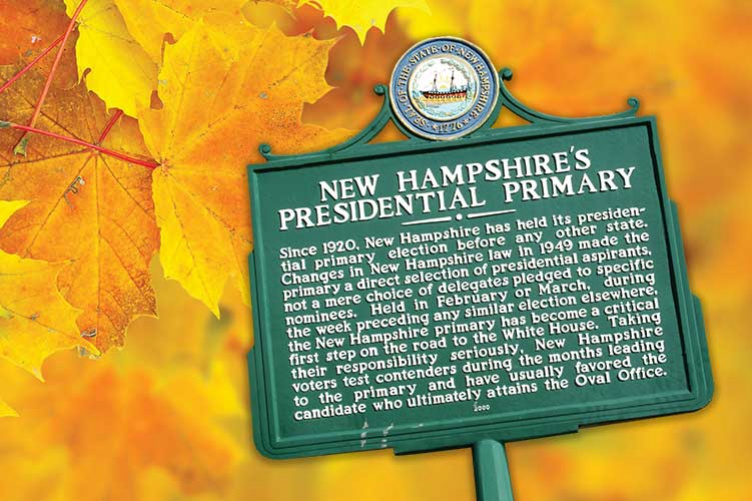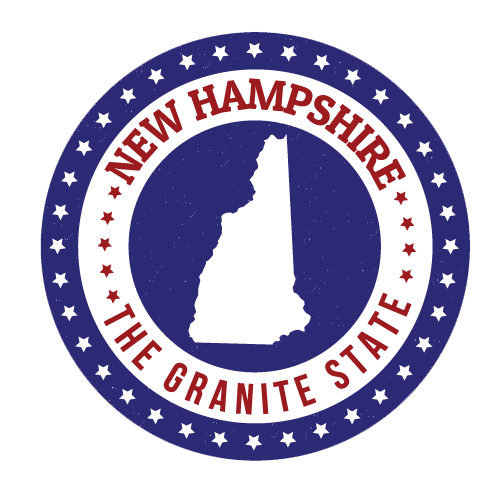
A Primary Primary
How Yankee frugality and Hubert Humphrey helped make the New Hampshire presidential primary an electoral spectacle
Primary season falls every quadrennial. It’s a marathon that starts about 18 months before the actual vote, when candidates — reporters in tow — press the flesh with voters on a very regular basis. New Hampshire’s exact primary day falls roughly between Halloween and the time the first crocuses pop up in the yard. And, importantly, it falls before any other primary election in the country.
But it almost didn’t.
An Accident of History
As Andy Smith explains it, in 1915, a New Hampshire lawmaker proposed a bill that would have set the state’s primary election during the third week
of May. State lawmakers quickly squashed that legislation, pointing out that a May primary would require lighting and heating town halls across the state twice. Instead, legislators set the primary date to coincide with town meeting day, which had occurred on the second Tuesday of March since the early 1800s. Thus, it was Yankee frugality rather than a codified plan that made New Hampshire’s first primary in 1916 one of the earliest in the nation.
But, Smith notes, “Nobody paid much attention to primaries back then. Candidates would compete in a couple of primaries to show they had public support, but they really weren’t competing for delegates in the primaries.” Although Republicans had a more open process, historically, and had held more primaries, as recently as the late 1960s, it was Democratic Party leaders in smoke-filled rooms deciding whom their nominees would be. That changed after the McGovern-Fraser reforms.

Primaries Become Primary
Despite alienating many liberals by toeing the line on U.S. war policy during his time as Lyndon B. Johnson’s vice president, Hubert Humphrey won the nomination at the 1968 Democratic National Convention without competing in a single primary.
“There were a lot of angry Democratic voters, many of whom were anti-war, who were upset that Humphrey got the nomination despite not getting a single vote in a primary,” Smith says.
The convention subsequently created a commission headed by then-Sen. George McGovern and Rep. Donald Fraser that set rules for how Democrats would vote on delegates for the national convention. The commission determined the party needed a much more democratic system — either a caucus or a primary — for choosing delegates. “What the commission really did was get rid of the whole idea that you could run for president and not compete,” Smith says. “Now primaries became important.” Especially early primaries.
McGovern, who resigned from the commission in 1971 to run for president, campaigned heavily in New Hampshire and other early states. He was the first candidate to understand the importance of the momentum-building early primaries, Smith says.
“Why else would New Hampshire be important? We’re such a small state, we have so few delegates; it doesn’t really matter if you win New Hampshire or not in terms of actually getting delegates at the convention. It’s the momentum that’s important, to show that you can win in an early state.”
McGovern won the nomination in 1972. Four years later, Jimmy Carter clinched the nomination using a similar strategy around the early primaries.
“So now not only do the candidates understand that’s how you can win the nomination, but states begin realizing the importance of the early primary. That’s when you saw other states begin to move their primaries earlier and earlier,” Smith says. And New Hampshire’s primary moved in concert when state leaders abandoned the set date in March in favor of a more flexible approach.
Here Comes the Cliffhanger
So why has New Hampshire been able to retain first-in-the-nation primary status despite the jockeying of other states? The answer to that, and many other details that make the New Hampshire primary a fascinating topic, is being discussed this fall in FIRST! Understanding New Hampshire’s Presidential Primary, a free and online six-week course Smith is teaching with Dante Scala, associate professor of political science. FIRST! participants gain not only an historical perspective on the primary but also a better appreciation of how elections and primaries actually work, and how different they are from one another.
More than 1200 individuals from locations around the globe are taking part in the course — and benefiting from the wisdom of the two leading scholars on the subject. Smith hopes that aside from shedding light on the primary, the class will also inspire participants to head to the state during the week between the Iowa caucuses and the New Hampshire primary and immerse themselves in the experience. “Go to Manchester,” he says. “See the media circus, the political circus. It’s like political Disneyland.”
—Tracey Bentley
FIRST! Understanding New Hampshire’s Presidential Primary runs through November 30. Upon conclusion, the class will be archived online and free for the taking.
The 2016 New Hampshire primary — the 100th anniversary of the state’s first — is currently scheduled for Feb. 9, 2016, but that could change depending on the movement of primaries in other states. The official date will be set by New Hampshire Secretary of State Bill Gardner ’70 in November.
Why does little New Hampshire wield so much power in the presidential nomination process? Just in time for the 2016 election season, UNH Survey Center founder David Moore and current Survey Center director Andrew Smith have published a new book, The First Primary, that takes a look at how — and why — the Granite State has shaped political elections over the past century. In the first chapter, Moore and Smith examine the issue of “New Hampshire envy”: the perception that the state derives substantial benefits from its first-in-the-nation status while also playing an outsized role in the presidential election.
New Hampshire Envy
In 1952, New Hampshire held its first primary in which voters could indicate their presidential preference. For the next two decades, as the results of the primary began to shape the nomination process in significant ways, New Hampshire envy began to fester. After the major reforms to the process took effect in 1972, which shifted the power of nomination from party bosses to the voters, the envy blossomed into full-scale resentment, as New Hampshire’s increasing influence on the process at the national level seemed way out of line with its
small size.
William Mayer at Northeastern University undertook a systematic study of the factors that predict how successful candidates are in their quest for the presidential nomination. The study is somewhat dated now, since it was published ten years ago and thus excludes the last three elections. Nevertheless, it still provides an insight into the dynamics of the nomination process for the previous two decades. And it confirms at least one tenet of New Hampshire envy, that the state plays a highly significant role in determining how many delegates a candidate wins.
In fact, according to Mayer’s study of the elections from 1980 through 2000, the two most important predictors of a candidate’s overall success were (1) the national poll standings before the start of the nomination process (before the start of the Iowa caucuses) and (2) the success of a candidate’s campaign in the New Hampshire primary — either a first or second place showing. His model shows that coming in first in the state increases a candidate’s expected share of the total primary vote (including all states) by “a remarkable” 27 percentage points, and a second-place finish in New Hampshire (in a multi-candidate race) increases the total by 17 points. By contrast, Iowa’s contribution to a candidate’s success in the nomination process appears to be indirect at best, sometimes helping (but sometimes hurting) a candidate’s success in New Hampshire, which could then influence how well the candidate does in the long run. “Of the two highly publicized events that lead off the delegate selection calendar,” Mayer notes, “the New Hampshire Primary towers over the Iowa Caucuses in its impact on recent nomination races.”

New Hampshire envy is the perception that New Hampshire, because it holds the first primary in the nation, derives a substantial array of political and economic benefits from that position and plays a highly significant role in determining who ultimately wins the major-party presidential nominations, despite the fact that it is a small state and is, in important ways, not particularly representative of the country as a whole.
— William G. Mayer and Andrew E. Busch
The Front-Loading Problem in Presidential Nominations
Defenders of the primary say that its small size is a reason that New Hampshire is a good state to begin the nomination process. Candidates with little money can invest their time in grassroots campaigning, and advertising on local television and in local newspapers is within reach of small campaigns that may not be able to afford spots in the extremely expensive large media markets in bigger states. Also, high turnout seems to indicate that New Hampshire voters are more engaged in the nomination process than are voters in other states.
And political reporters like the primary as well — or certainly they like covering the small state of New Hampshire more than they like trying to cover the much more spread-out state of Iowa. Perhaps the clearest articulation of this comes from veteran columnist Jules Witcover:
“The New Hampshire primary has become as much a staple in the national political diet as national conventions, election day in November, or a president’s inauguration. . . Veteran political reporters like New Hampshire because they know all the players in presidential politics down through the years, and the state is so manageable. One can bed down in Manchester for several weeks and travel to most parts of the state and back in a day. It is like going to spring training camp for a major-league baseball player. Here is the place where rookies on the make and veterans trying to prove they have one more season in them test themselves before smaller crowds than they will encounter later down the road."
Importance of the New Hampshire Primary Overrated?
Despite conventional wisdom, there is some evidence that the importance attached to the New Hampshire primary may be overblown. The very same article by William Mayer that reports the towering influence of the New Hampshire primary also contends that the nomination system has evolved into one that highly favors the early front-runners. In the first two elections following adoption of the reforms, George McGovern (1972) and Jimmy Carter (1976) were not the front-runners for the nomination, yet each won his party’s nomination. And in 1980 George Bush, also not the front-runner, seemed to have the momentum to win the GOP nomination after his surprise victory over Ronald Reagan in the Iowa caucuses — but he was derailed in New Hampshire. The long-shot candidate Gary Hart in 1984 experienced the same tantalizing hope of winning the nomination after his surprise victory over front-runner Walter Mondale in the New Hampshire primary. But in the end, Mondale won. Still, these early victories and almost-victories by long-shot candidates gave the impression that momentum from the New Hampshire primary was an important, and sometimes even determinative, factor in a candidate’s quest for the nomination. No longer, says Mayer. “Whatever may have happened in 1972 or 1976, a very different sort of outcome has occurred in every race since then. In the last ten contested nomination races, the candidate who won was the front-runner — or at least one of the front- runners — before any of the delegates
were selected.”
“Whatever may have happened in 1972 or 1976, a very different sort of outcome has occurred in every race since then. In the last ten contested nomination races, the candidate who won was the front-runner — or at least one of the front- runners — before any of the delegates were selected.”

The implications of this development are profound. They suggest that the nomination process is mostly one of confirming what everybody (or at least
a plurality) is thinking before even the first vote is cast. In that case, it no longer really matters which state goes first or second in the nomination calendar, because all of the work that is needed to win the primaries — fund-raising, establishing a competitive organization, strategic planning — has already been accomplished and is reflected in the national polls. Thus, the presumed importance of the New Hampshire primary is really an illusion. The primary is more a reflection of the candidates’ strengths more broadly than it is an opportunity for a vulnerable candidate to obtain momentum for the future.

Then came the election of 2008, which contradicts Mayer’s model. The Democratic Party’s dominant front-runner for all of 2007 and into 2008 was Hillary Clinton, who retained her lead even after the Iowa caucuses, which she lost to the eventual nominee, Barack Obama. And the GOP front-runner for all of 2007 right up until the Iowa caucuses in 2008 was Rudy Giuliani, followed briefly by Mike Huckabee after his surprise win in Iowa, followed by the eventual nominee, John McCain. Both of these nomination races reveal how important the early contests actually were. By winning Iowa, Obama did in fact gain momentum that in the long run helped him prevail. By winning in New Hampshire, Clinton staved off a complete collapse of her candidacy, which almost certainly would have occurred had she lost the primary as well as the caucuses. Similarly, McCain’s “comeback” in 2008 was made possible by his victory in New Hampshire, after he had fallen to fourth place in the national polls with only 10 percent support.
The last election cycle also calls into question the prediction that the early front-runner will necessarily (or almost certainly) win the nomination. In 2011, Mitt Romney led in the polls until August, when Rick Perry surged into the lead, before Herman Cain had a temporary fling at being the leader, followed by Newt Gingrich, who was at the top of the polls just before the Iowa caucuses. Romney was not the front-runner as the nomination process began, though eventually he won.
For the 2016 election cycle, there appears as of this writing (winter of 2015) to be no clear front-runner for the GOP nomination, while Hillary Clinton is the overwhelming front-runner for the Democratic nomination. Given Mayer’s model and the overwhelming consensus of the party elite, it would appear that however the press might try to insist that Clinton’s nomination is not a sure bet, in fact it is. The New Hampshire primary is likely merely to confirm that outcome, rather than actually contribute to it. For the front-runner-less Republicans, however, the New Hampshire primary and the Iowa caucuses are likely to have profound effects on who eventually wins the nomination.
Regardless of how much the party establishments are able to “tilt the playing field” in favor of their preferred candidates, we know that candidates, political leaders, and — most importantly — the press all believe that the New Hampshire primary is monumentally important. No serious presidential candidate will skip New Hampshire in the belief that a more favorable primary later in the calendar will be more advantageous than competing in the Granite State.

This situation raises a question we do not intend to address: Given the small size and unrepresentative character of the state, should New Hampshire be allowed to hold the first primary? That is a question for another book or venue. Here we do not defend New Hampshire’s premier position, nor do we condemn it. We recognize it as a fact of life, and that the state is doggedly determined to keep it that way. We are more interested in addressing what is, rather than what should be.
And the first question is this: How did New Hampshire get and maintain its premier position in the nomination calendar, despite widespread New Hampshire envy and almost universal opposition from other states?
Adapted from The First Primary, by David Moore and Andrew Smith (University of New Hampshire Press 2015). Excerpted with permission.
Originally published in UNH Magazine—Fall 2015 Issue



















































